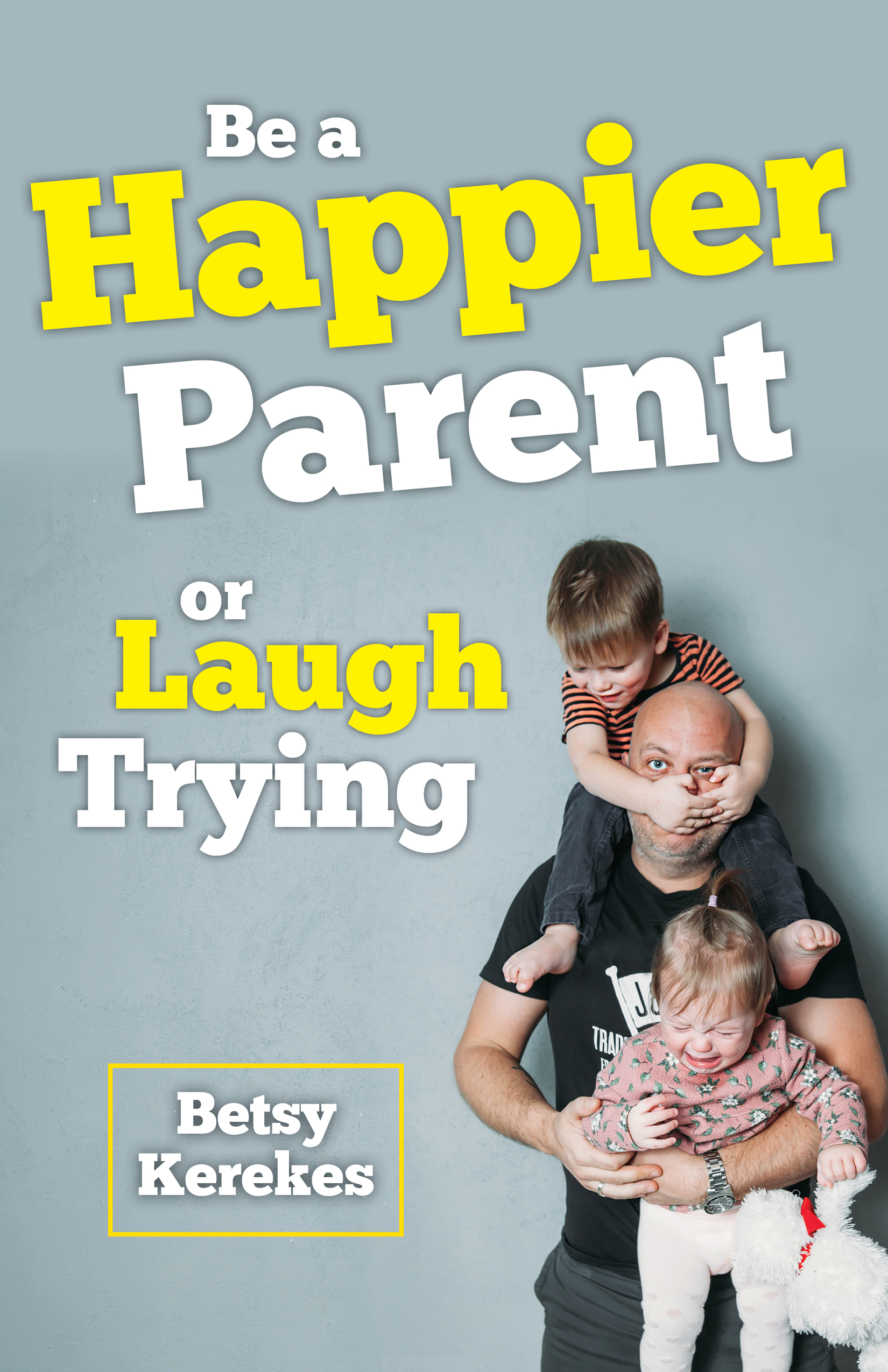Top Ten Parenting Tips

Single parenting, co-parenting, helicopter parenting, authoritative parenting, controlling parenting, and permissive parenting are the different styles of parenting.
If you think you have arrived in life try getting married. A spouse is like a mirror, a lot of your faults get exposed. If after marriage you still think you have arrived in life, try having a kid, and become a parent.
Parenting is one of the most challenging things I have done in my life and also the most rewarding. It requires unconditional love, being unselfish, investing emotions, energy, time, feelings, and lots of forgiveness.

Betsy Kerekes is the author of Be a Happier Parent or Laugh Trying and coauthor of 101 Tips for a Happier Marriage and 101 Tips for Marrying the Right Person. Her professional experience includes public relations for Franciscan University of Steubenville, proofreading for Patrick Madrid’s Envoy magazine, and contributing to Aleteia, MercatorNet, Catholic Lane, Catholic Exchange, CatholicMom.com, The Southern Cross, and Creative Minority Report. Kerekes serves as editor and director of online publications at the Ruth Institute, where she writes weekly newsletters and manages the blog. She telecommutes from her home near San Diego, where she homeschools her four children and blogs about her parenting adventures.
Betsy offers her Top Ten Parenting Tips from her book Be a Happier Parent or Laugh Trying

One
There are as many different ways to parent as there are parents. You do what works for you, and don’t worry about what everyone else thinks. And by all means, don’t compare your child to others. A mom who had a baby around the same time as I had my first made a comment about teething. I mentioned that my daughter had four teeth coming in at once, only because I thought it unusual. The other mom seemed upset by this news and got defensive — over teeth, as though the rate at which children sprout teeth somehow determines who will go to a community college and who will go to Harvard. Don’t stress over supposed milestones or how your kid measures up. Do your best, and don’t worry about the rest.
Two
Because parenting is hard, cruddy stuff is going to happen. It just comes with the territory. Taking a deep breath and moving on after an unfortunate incident will help you maintain a happier demeanor, inside and out, especially when it comes to things you have no control over. Some days your children are just going to be fussy like they’re taking turns or have it scheduled on a secret calendar. Keeping a sense of humor helps. Once I asked a friend how her kids were. She responded: “For sale.”
Three
No sane person thinks parenting is easy, but focusing on the blessings in your life, even if your house is a mess or the laundry is piling up, is the antidote to the parenting pits. Clearly, your kids don’t mind those messes since they enjoy making them, and rolling around in a pile of unfolded laundry is the rainy-day equivalent of jumping in a pile of leaves. Why deprive your children of that joy? Instead, maintain an attitude of gratitude by focusing on the positive. Your children have enough clothes that they can get dirty. The dishes stacked in the sink prove that you have ample food for your family. Ice cream exists. And the list goes on and on.
Four
If you’re a perfectionist, having children may be particularly difficult, especially if you’re the type who tries to maintain a spotless home. You can be happier if you adopt this principle: Let it go. Embroider it on a pillow if necessary. Here’s a scenario: after breakfast, the floor under your table looks like the leftovers at the carnival in Charlotte’s Web. You want to sweep it immediately, but you’re unable because you’re wrangling tiny people all day. Lunch happens, and now the floor looks like the streets of New Orleans after Mardi Gras. You want to pull your hair out, but you still haven’t found time to clean. The solution? Make like Elsa and let it go. I don’t mean go a week without sweeping under the table. If mice move in to clean up the mess for you, well, that could be a win or a loss. The floor is getting clean, but if those mice start building temples to their gods complete with statues made from food scraps that impressively resemble your children, you may have a problem. Get out the broom and destroy a civilization. But for those everyday things that put the perfectionist in you on high alert, remember that the world won’t end and your house won’t fall down around you if you don’t get to it right away. Take a deep breath, do what you can, when you can, and don’t stress over it unnecessarily. I saw a meme that said: “Once you stop caring that the Play-Doh colors are mixed together, the second part of your life begins.” I totally get that. It took four kids, but I’ve finally arrived.
Five
Keep your negative reactions in check. Imagine you’re potty training your child. (Did you just shudder? My apologies.) Now imagine you take your child to the potty, but she doesn’t want to go. You try again later and still nothing. You ask her if she needs to go. She insists she doesn’t. Next thing you know, her pants are wet. You, frustrated by the whole experience, kind of lose it. “Look what you did! You wet your pants! I tried to get you to go on the potty. I sat you down, you said you didn’t need to go. Then I asked again, and you still said no. One minute later you’ve wet yourself. Now I have to wash you up and find clean clothes and…” etc. Unbeknownst to you, this reaction is teaching your child to lie in order to avoid seeing you angry or be yelled at. You can express disappointment, sure, but remain calm and patient. You want your child to feel safe coming to you with the truth when she ran a purple marker across the back of the white couch or when he threw a ball indoors and knocked over a lamp. If such incidents happen and you fly off the handle, don’t be surprised when you’re met with tight lips after asking who swirled a magnet across the computer screen.
Six
Related: Model not making a mountain out of a molehill. When my kids hurt themselves, I’m kind of like, “meh.” Yes, I’ll tend to the wound, but I won’t make a bigger deal out of it than it warrants. When I was a school secretary, kids would sometimes come to me asking for a Band-aid for some microscopic cut. When I couldn’t see anything, they’d squeeze until the tiniest drop of blood was visible. My favorite kids were the ones who came to the office with blood I could see from several feet away. I’d say, “Whoa, let me get you a Band-aid,” but they’d be like, “Nah, I’m just going to slap a paper towel across it and head back out.” Those kids were all from the same hardy family of goat owners. I loved them. The kids, not the goats. Maybe both. Baby goats are kids, so I guess both. These children didn’t try to make a huge fuss in order to get attention. They dealt with the problem simply and moved on. They were tough, and that’s an attitude that will get them far in life. I recommend encouraging that in your kids, goat, or human. For the more sensitive children, you can always point out that each passing moment gets the owie closer to being healed. You can also remind them that tomorrow they’ll feel so much better (or by bedtime, or in like one minute, depending).
Seven
Younger kids might be bothered that they can’t do the same things as their older siblings, like check the bear traps or drive the Batmobile. At a playground, a little girl was crying because she couldn’t swing across the monkey bars like her big brother. The mom assured the girl that her brother was able because he’d done it more times. “Practice makes progress,” she said. I found that interesting. We can’t promise our kids they’ll become perfect at something, even with lots and lots of practice. No one is perfect at everything, despite what you see on Pinterest boards. By using the word “progress,” this mom helped her daughter realize that though she may not be great at something now, she can improve with repeated effort. The less obvious message is that the popular trope of “you can be anything you want if you just try hard enough” is false. Despite this “good parenting” mantra of our modern culture, not everyone who wants to can become a Nobel prize winner, or an astronaut, or Adele. If your kids discover their big fabulous dream isn’t coming true, it’s an opportunity to point out that God might not mean for them to cure a common cold, build a better mousetrap, invent a new ice cream flavor, save an endangered species, and all those things on the Game of Life “Life Tiles.” Of course, you should encourage your kids to reach reasonable goals, but remind them that if things don’t seem to be working out, it may be because God has another, a better plan that will take prayer and time to figure out.
Eight
Sharing is good, but don’t force it. Even though “don’t forget to share” is a common parental phrase, we shouldn’t make our kids give up a toy or the swing for someone else all the time. Sharing is no doubt important, but only when the child does so from his own initiative. We can model sharing by doing so ourselves and then encouraging our kids to follow suit by pointing out how sharing has made another person happy. For them, you could say, “How nice of you to let the other boy play with your ball. See how happy you made him? Thank you for sharing.” However, sharing isn’t always appropriate. What if your child wasn’t finished on the swing? Instead, offer him advanced notice that soon it will be someone else’s turn. “Five more minutes on the swing then let someone else have a go.” Another option is playing together. “How about you kick the ball back and forth to each other?” rather than making your child give up his toy entirely. Being nice is one thing, but we don’t want our children to feel like sharing is a punishment when they haven’t done anything wrong.
Nine
Strive to make family dinner the norm. Being together strengthens the familial bond, builds positive relationships among siblings, and generally keeps teenagers out of the usual teenagery troubles. Younger kids learn new vocabulary words (for good or bad) and proper table manners. Everyone is more apt to eat healthily and therefore be healthy, and you’ll have a better idea of what’s going on in your kids’ lives. To get the ball rolling, you can play the high/low game where each person names the best and worst part of their day: “We bought a new carton of ice cream! That carton is now empty.” It’s a great way to find out what drives and motivates your kids.
Ten
You might think you’ll be truly happy if you could just have a girl, a boy, your dream home, a new car, a better job, or an ice cream shop to open up within walking distance. Perhaps you feel you’ll be happier when the kids are older and easier, or when they’re no longer teenagers, or when you have an empty nest, or when you can finally retire. But if you continue thinking that way — waiting for that next thing that you’re sure will make you happy — you’ll never be happy. Instead, find the joy in your life as a parent today.

Want more fun parenting advice, packaged in a humorous way? Find Be a Happier Parent or Laugh Trying at Amazon, Barnes & Noble, and Walmart.


Great thoughts! Especially finding joy in today, not just looking to the next big thing in life. It’s funny how it takes a while before you realize how very VERY true it is!
Very true, Crystal. With age comes wisdom… and perspective. 🙂
Great tips, Betsy. So many apply to the adults I teach also!
Loving these tips. You’re so right. Parenting is filled with unexpected incidents and chaos. Go with it!
Nice tips! Parenting really is a journey filled with many thrills and chills lol!